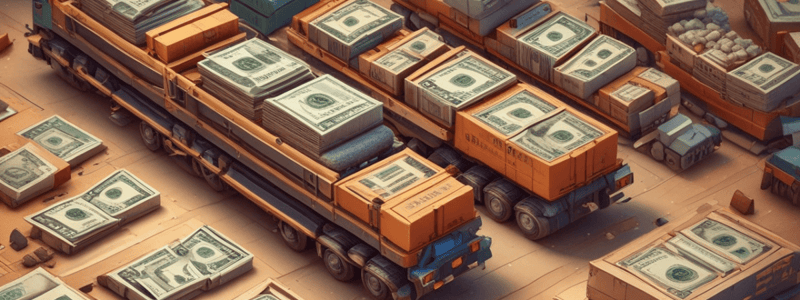Podcast
Questions and Answers
What is the primary objective of a capitalist economic system?
What is the primary objective of a capitalist economic system?
- Eliminating private ownership
- Achieving social equality
- Allocating resources through central planning
- Maximizing individual profit (correct)
Which economic system is characterized by private ownership and market forces?
Which economic system is characterized by private ownership and market forces?
- Communism
- Socialism
- Planned economy
- Capitalism (correct)
What is the primary role of government in a market economy?
What is the primary role of government in a market economy?
- Regulating markets to ensure competition (correct)
- Controlling all production and distribution
- Providing universal healthcare
- Eliminating private ownership
How does specialization contribute to economic efficiency?
How does specialization contribute to economic efficiency?
What determines prices and quantities in market economies?
What determines prices and quantities in market economies?
What is the primary purpose of using economic models and graphs?
What is the primary purpose of using economic models and graphs?
Which of the following best describes the fundamental problem of economics?
Which of the following best describes the fundamental problem of economics?
If you choose to spend an hour studying instead of watching a movie, what is the opportunity cost of your decision?
If you choose to spend an hour studying instead of watching a movie, what is the opportunity cost of your decision?
Which of the following is NOT a factor of production?
Which of the following is NOT a factor of production?
What role does competition play in a market economy?
What role does competition play in a market economy?
Which of the following is an example of a scarce resource?
Which of the following is an example of a scarce resource?
What is the primary role of capital in the production process?
What is the primary role of capital in the production process?
Study Notes
Economics Basics
- The primary concern of economics is allocating scarce resources.
Scarcity
- Scarcity occurs because resources are limited, but wants are unlimited.
Scarcity Examples
- Gold is an example of a scarce resource.
- Air and sunshine are not scarce resources, as they are abundant and available to everyone.
- Friendship is not a scarce resource, as it's an emotional connection and not a physical resource.
Opportunity Cost
- Opportunity cost is the value of the next best alternative foregone.
Competition and Consumers
- Competition benefits consumers by lowering prices and improving quality.
- It does not increase prices, reduce quality, or decrease choice.
Factors of Production
- The factors of production are land, labor, and capital.
- Goods and services are not factors of production, but rather the result of production.
- Money and resources are not factors of production, but rather tools used in the production process.
- Demand and supply are not factors of production, but rather market forces that affect prices and quantities.
Labor
- Labor represents human effort in the production process.
Capital
- Capital refers to machinery, tools, and equipment used in production.
- It does not represent money and financial assets, natural resources, or the skills and abilities of the workforce.
Economic Systems
- The goal of economic systems is to allocate resources efficiently.
- It is not to maximize individual profit, achieve social equality, or eliminate government intervention.
Capitalism
- Capitalism is an economic system that relies on private ownership and market forces.
- It is not socialism, communism, or a mixed economy.
Government Role in Market Economy
- The primary role of government in a market economy is to regulate prices and production levels.
- It is not to control all production and distribution, minimize government intervention, or provide universal healthcare.
Specialization
- Specialization contributes to economic efficiency by focusing on comparative advantage.
- It does not reduce trade, increase competition, or limit consumer choice.
Prices and Quantities
- Prices and quantities are determined by supply and demand in market economies.
- It is not determined by government regulations, consumer preferences, or business profits.
Supply and Demand
- Supply and demand determine prices and quantities in market economies.
- They do not determine wealth distribution, regulate prices, or eliminate competition.
Economic Models and Graphs
- Economists use models and graphs to simplify complex ideas.
- It is not to confuse people, make predictions with certainty, or control economic outcomes.
Studying That Suits You
Use AI to generate personalized quizzes and flashcards to suit your learning preferences.
Description
Test your knowledge of fundamental economic concepts with this quiz! Questions cover topics like scarcity, resource allocation, and economic concerns. Choose the correct answers to show your understanding of key economic principles.




